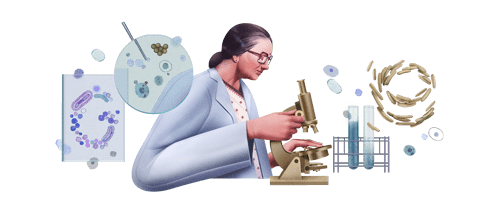
Dr. Kamal Ranadive honoured with Google Doodle
Dr. Kamal Ranadive was an Indian cell biologist who was paid tribute today, on her 104th birth anniversary, by Google in their doodle of the day made by Indian artist Ibrahim Rayintakath.
While creating the doodle, Rayintakath took inspiration from 20th century lab environment and microscopic world of cells related to leprosy and cancer, said the Indian artist in a google blog post. Through this doodle, he hopes that people will take a greater interest in the life of the great Indian biologist and learn more about her contributions to the field of biology.
Dr. Kamal is prominently known for her research in cancer. She has also aided in developing a vaccine for Leprosy. She is also the founding member of the Indian Women Scientists’ Association, and is noted for her devotion towards creating a society of equality through science and education.
Dr. Kamal Ranadive
She was born on 8th November (Today) in 1917 in Pune as Kamal Samarath. Dr. Kamal’s family encouraged her to study medical science, but Kamal’s heart was set on biology and she went onto achieve greatness in her field.
She graduated from H.H.C.P. High school for girls and later joined Fergusson College to study botany and zoology. She later moved to the Agriculture College in Pune to finish her master’s degree and studied “Annonaceae of Cytogenetics”.
She married JT Ranadive to become Kamal Ranadive and moved to Mumbai (Then Bombay).
In Mumbai, she met VR Khanolkar, a prominent pathologist who eventually formed the Indian Cancer Research Centre. She earned her doctorate under his supervision from the Bombay University.
In 1949, while working as a researcher at Indian Cancer Research Center (ICRC), Kamal Ranadive received her PhD in cytology (the study of cells) and became Dr. Kamal Ranadive.
Dr. Kamal moved to US for a post-doctoral stint at John Hopkins University in Baltimore, USA. Once done with her fellowship at the John Hopkins University, she moved back to Bombay (Now Mumbai) and rejoined ICRC.
She strongly believed that the scientists of India who went to study abroad or for their post-doctoral work should come back to the nation and help in the development of new areas of research in their respective laboratories, according to an essay by scientist Rajani Bhisey.
In ICRC, she established the country’s first tissue culture laboratory, according to Google.
As the director of the ICRC and a pioneer in animal modeling of cancer development, Ranadive was among the first researchers in India to propose a link between breast cancer and heredity and to identify the links among cancers and certain viruses. Continuing this trailblazing work, Ranadive studied Mycobacterium leprae, the bacterium that causes leprosy, and aided in developing a vaccine.
Indian Women Scientists’ Association (IWSA)
In 1973, Dr. Ranadive and 11 colleagues founded the Indian Women Scientists’ Association (IWSA) to support women in scientific fields.
The IWSA today has 11 chapters and is providing scholarships and childcare options for women in science.
Retirement
After her retirement in 1989, Dr. Ranadive continued serving the society as she worked on the nutrition and the health of tribal women and children in Rajur in Maharashtra. Dr. Ranadive was fondly called “Bai” by her followers.
Dr. Kamal Ranadive passed away on 11th April 2001 at the age of 83.
Dr. Ranadive’s dedication to health justice and education remains influential even today among her students who work as scientists in different fields now.
Awards and Accolades
In 1964, she became the first woman to receive the Medical Council of India’s Silver Jubilee Research Award for her contribution in cancer research.
Further, she was bestowed with the Padma Bhushan in 1982 for her services in the field of medicine.
